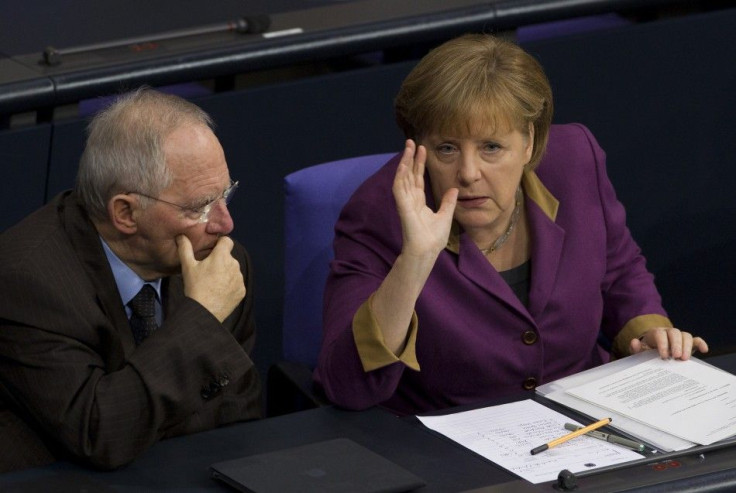EU Leaders Warn Greece: Stick To Austerity Or Leave Euro

European leaders reaffirmed their desire to keep Greece in the euro zone on Wednesday, but warned the ailing country to stick to strict debt reduction conditions or face expulsion from the currency community.
Speaking at a summit in Brussels, the heads of Germany and several EU institutions all urged the debt-stricken country to stick to the deeply unpopular tax hikes, labor reforms and welfare cuts that have divided Greece and pushed it to the brink of exiting the currency union.
We discussed the political and economic situation in Greece. We want Greece to remain in the euro area while respecting its commitments, German Chancellor Angela Merkel said.
Continuing the vital reforms to restore debt sustainability, foster private investment and reinforce its institutions is the best guarantee for a more prosperous future in the euro area.
We expect that after the elections, the new Greek Government will make that choice.
The European Central Bank President Mario Draghi added: We want Greece to stay in the euro, but we insist that Greece sticks to commitments that it has agreed to.
Despite the agreement over Greece, the Brussels summit also exposed the deep divisions between euro zone members on how to tackle the mounting debt crisis.
The election of French President Francois Hollande earlier this month has fractured the traditional Franco-German alliance, with the French premier's desire to tackle the sovereign debt crisis through growth clashing with Chancellor Angela Merkel's predominantly austerity-led agenda.
Wednesday's summit focused on the issue of euro bonds, a financial instrument championed by Hollande as a way to stimulate growth in the continent's ailing economies.
The Socialist President believes capital raised by issuing the bonds could be used to fund continent-wide job-creation programs.
Merkel has repeatedly rubbished the idea, saying the bonds would violate EU treaties and would not contribute to kick-starting growth.
Indecision and divisions within the euro zone camp led to European stock markets falling around 2 percent on Wednesday.
Leaders are now bracing themselves for another crucial summit on June 28.
Meanwhile, not everyone is convinced that a Greek exit from the euro zone would necessarily lead to catastrophic results in the country.
Ben May, European economist at Capital Economics in London, commented that, in the event of a sudden departure from the currency bloc, the Greek government (whatever form it eventually takes) could reduce its financing needs by defaulting on its debts and refusing to make all outstanding interest payments.
[The] government's primary budget deficit (which excludes interest payment) this year might be as low as 1 percent of GDP, he wrote.
Second, if a default substantially reduced the public debt burden, the government might not be shut out of the [financial] markets for too long. Indeed, historical experience suggests that it might only be a few months (rather than years as is often assumed) before it could borrow from the markets again.
May further adds that even outside the euro zone, Greece could still receive financial assistance from the EU, or even the IMF for a period of time. As long as credible fiscal and monetary frameworks were established, temporarily getting the central bank to buy limited amounts of government debt would be unlikely to prompt a sustained bout of high inflation, May added.
After all, the major economic slump of recent years has left Greece with huge amounts of spare capacity.
© Copyright IBTimes 2024. All rights reserved.





















